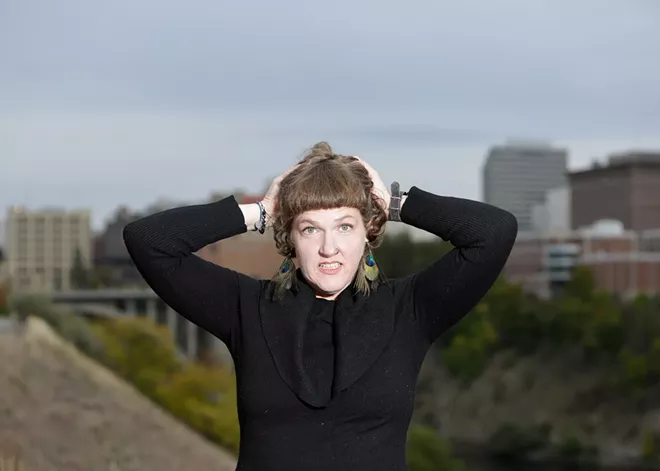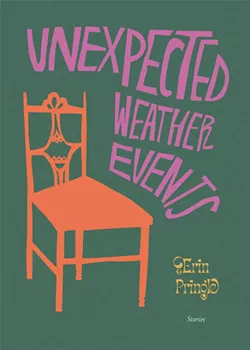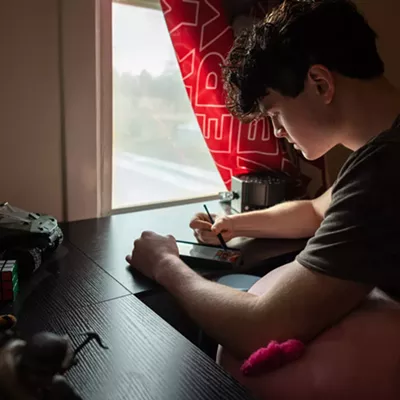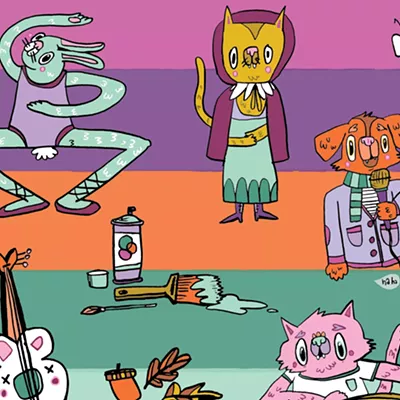Erin Pringle is on a first-name basis with grief.
She has shaken hands with grief, met grief at parties, and has even welcomed grief into her life with open arms.
In her new short story collection, Unexpected Weather Events, Pringle introduces readers to characters who are navigating peril, heartache and loss in different ways across various landscapes and moments in time.
Pringle calls the semiautobiographical book "a collection of terribly sad stories sprinkled with a bit of dry, black humor."
"I'm very comfortable writing about grief and saying things about grief," Pringle says. "These stories are the vehicles I use to talk about it."
Pringle's sister died by suicide 13 years ago, and Pringle says the experience has informed her writing ever since. Her 2020 book, Hezeda! I Miss You, touched heavily on suicide and the impact it had on those left to live on after its painful wake. However, Unexpected Weather Events revolves around characters currently in the midst of their sorrow. Every sentence drips with melancholy. Every word is an arrow pulled straight from the quiver of despair.
Bull's-eye.
"There's a real lack of serious exploration into the experience of someone dying in that way, someone you're close to," Pringle says. "There's a faux, artistic interest in suicide. It's this kind of romantic idea that appears all over the place. People look at it like the dead body at the beginning of every mystery novel rather than an actual person and the people affected by it."
Though touching on heavy topics, her prose feels lighthearted and somewhat hopeful — something readers wouldn't expect from a collection of stories stained by grief.
Pringle's use of short sentences and maximalist language is no accident — she's a hardcore poetry fanatic.
"When I'm reading poetry, I feel so settled inside," she says. "There are far too many rules in fiction, so my general rule is to break every rule."
Pringle grew up in the rural Midwest, in an Illinois town with a population of 3,000. There, death was a popular topic of conversation among residents — an inescapable reality of small-town living.
"There are never as many young people as there are old in small towns," Pringle says. "So you're always very aware of who's died or who's about to die. You're always thinking about who you are in relation to other people. People's deaths were important because they were important to you."
Before she became a writer, Pringle believed she would become a visual artist. Now, instead of creating images on a canvas, she paints pictures with her words.
"I think about words like they're paper and watercolors," she says. "I layer and layer and layer until I see the story form."
In one of the book's stories, "The Telephone Game," Pringle writes about two college students who buy toy telephones from a yard sale, using them to play out conversations laden with jokes and giggles.
"After the phones were ours," she writes. "We played with them a little more that day, and then they sat in each of our apartments, gathering dust as we did homework, studied for exams, tried to fall in love with boys, and smoked cigarettes and drank wine like we knew a thing or two about living."
Pringle paints a picture of youthful wonder and joy with her prose.
"We graduated. I moved away. You got sick." A knife to the heart. "Your heart worked your lungs to death. Until you died."
Then, the turn of the knife.
"And were buried in the way of many people. Layered away in a vault, casket, dirt, grass, graveyard — your name left on a tombstone while the rest of us are stumbling."
This dichotomy is present throughout the whole collection as Pringle reels in readers and slowly lets them out, assuring them that grief never leaves us fully.
Throughout the book, Pringle uses household objects as a way of showing the permanence of grief. "Chair, $75 OBO," the fourth story in Unexpected Weather Events, came from a daydream Pringle had one day of her deceased sister showing up at her house, asking to buy her reading chair.
UNEXPECTED WEATHER EVENTS
Release Party
Sun, Oct. 1, Shadle Library
Book Reading & Signing
Sun, Oct. 8, Auntie's Bookstore
Book Reading & Signing with Sharma Shields
Thu, Nov. 16, Wishing Tree Books
The aforementioned toy telephones and the reading chair (which graces the cover of the book) are meant to be constant reminders of grief's ever-looming presence.
"My two brothers run an antique business," she says. "So, I spend a lot of time going into antique malls and looking at things. The tangible remains of past lives. Objects that hold time."
As Pringle weaves in and out of memory and reality in her prose, it's clear that her relationship with grief is complicated.
"These stories circle grief because it's what I have experienced," she says. "It's unavoidable." ♦
Learn the warning signs that can indicate whether a person is considering suicide: talking about wanting to die or harm themselves, feeling hopeless or trapped, acting anxious or agitated, isolating themselves, showing extreme mood swings, including suddenly appearing happier or calmer. Call Frontier Behavioral Health's First Call for Help hotline 24/7: 838-4428. The National Suicide Prevention Hotline is 1-800-273-8255, or you can text the Crisis Text Line at 741741.

























